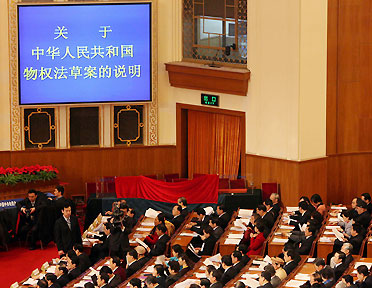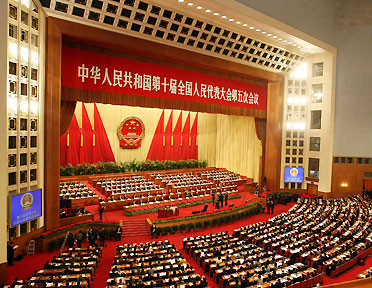| Tools: Save | Print | E-mail | Most Read |
| NPC Reviews Major Property, Corporate Income Tax Legislation |
| Adjust font size: |
Both drafts were submitted for deliberation at the ongoing annual session of the Tenth NPC, as lawmakers gathered for their second plenary meeting in the Great Hall of the People in Draft Property Law Reading an explanation of the property law to assembled deputies, Wang Zhaoguo, vice chairman of the NPC Standing Committee, said that "enacting the property law is needed to uphold the basic socialist economic system, to help regulate the socialist market economy, and to safeguard the immediate interests of the people." Once enacted, the law will ensure equal protection is given "to the property of the state, the collective and the individual as stipulated in the Constitution," added Wang. Wang said that following the rules of a socialist market economy, all parties enjoy equal market status, benefit from the same rights, and respect the same rules and responsibilities. "If all areas of the market are not catered with equal protection, or if varied methods are employed in settling disputes or determining legal responsibility, it will not be possible to develop the socialist market economy, nor is it possible to uphold and improve the basic economic system of socialism," Wang said. To prevent any loss of state property, the law will boost protection of state-owned property in five important aspects, namely strengthening prohibitive measures against illegal possession, looting, illegal sharing, withholding or destruction of state property. Those found guilty of the above infractions against state property will be prosecuted to the full extent of the law, according to a full text of the draft distributed to the press at the session. Wang said the law also respected "the current basic policies of the Party in rural areas" and kept in mind the most urgent problems in coordinating national interests and promoting harmony. In order to grant the farmers a long-term and guaranteed land-use right, the draft property law stipulates that when farmers' land contracts expire, the contractor can have the contract renewed. As part of the draft civil code, the property law first came before the NPC Standing Committee back in 2002, after close to a decade of preparation. In order to take public interest into account from all sectors of society, the law was made public in July 2005 with over 10,000 comments and suggestions being received in consequence. After an unprecedented seventh reading, the NPC Standing Committee decided last December to finally put the law up for vote at the Fifth Session of the Tenth NPC, calling the latest draft "a mature crystallization of the wisdom of the collective". Draft Corporate Income Tax Law For its part, the draft enterprise income tax law will propose a new 25 percent unified income tax rate, concerning all companies, both foreign and domestic. Whilst explaining the law, Finance Minister Jin Renqing said it had been drafted to "create a scientific and standardized income tax system applicable to all enterprises and create a fair competitive environment." As it stands, domestic and foreign-funded enterprises are taxed at a flat 33 percent rate. However, in some special regions, some foreign-funded enterprises benefit from a preferential rate of 24 or 15 percent, and domestic low-profit enterprises are levied at two brackets of special rates of 27 percent and 18 percent respectively. "Too many tax rate brackets allow for a large disparity between nominal income tax rates and the tax burden reality for different types of enterprises. To end this disparity, a unified income tax rate becomes necessary," Jin said. He revealed that the proposed 25 percent of tax rate would likely ease the tax burden on most domestic enterprises while keeping in check an eventual rise for foreign-funded enterprises. International statistics put the average enterprise income tax rate across 159 countries and regions at 28.6 percent with the rate in "The rate of 25 percent is comparatively low to the rest of the world, thus allowing improvement in enterprises' competitiveness and attracting more foreign investment," Jin told lawmakers.
Transitional preferential measures were given to allow the old enterprises, which had an income tax rate of 15 percent or 24 percent under the current tax laws, to enjoy a gradually increasing income tax rate within five years after the new tax law takes effect, according to the draft law. By 2006,
(Xinhua News Agency March 8, 2007) |
| Tools: Save | Print | E-mail | Most Read |
 |
| Related Stories |
|
Product Directory China Search |
Country Search Hot Buys |



